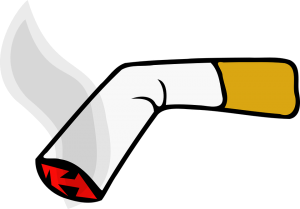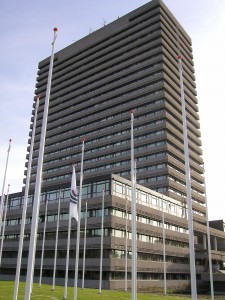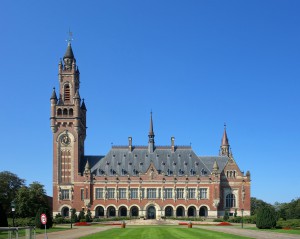 Op 29 april 2016 deed Bénédicte Ficq namens de Stichting Rookpreventie Jeugd aangifte
Op 29 april 2016 deed Bénédicte Ficq namens de Stichting Rookpreventie Jeugd aangifte
tegen vier grote tabaksfabrikanten. De aanklacht is fors, de tabaksindustrie zou moeten worden vervolgd voor poging (art. 45 Sr jo) tot moord en/of doodslag (art. 289 resp. 287 Sr) poging zware mishandeling (303 Sr) en/of opzettelijke benadeling van de gezondheid (art. 300 jo 301 Sr), en valsheid in geschrifte (art. 225 Sr). Daarbij richt de aangifte zich niet alleen tot de bedrijven, maar ook tot de feitelijk leidinggevers.
Maandelijks archief: februari 2017
Dutch Supreme Court upholds immunity of the European Patent Organization in collective labor case
 On 20 January 2017, the Dutch Supreme Court ruled that it had no jurisdiction over claims brought by two trade unions against the European Patent Organization (EPO), an international organization (partly) based in The Hague. The Court held that the organization enjoyed immunity from the jurisdiction of Dutch courts in accordance with the EPO Protocol on Privileges and Immunities. This judgment puts an end to a drawn-out and highly public case which threw the spotlight on the poor employment conditions in the EPO, including apparent restrictions of employees’ right to strike and to participate in EPO decision-making. The Supreme Court could be criticized for upholding the organization’s immunity in this case. However, from a systemic point of view, it is heartening that the Court affirmed the principle that conferring immunity from jurisdiction should not affect the very essence of a claimant’s right of access to justice, enshrined in Article 6 of the European Convention on Human Rights (ECHR). In future cases, claimants can continue to rely on Article 6 ECHR to challenge acts of international organizations before Dutch courts. As far as the EPO case is concerned, it is hoped that, even if the EPO’s immunity was upheld, the Dutch litigation serves as a wake-up call to push through important reforms within the organization.
On 20 January 2017, the Dutch Supreme Court ruled that it had no jurisdiction over claims brought by two trade unions against the European Patent Organization (EPO), an international organization (partly) based in The Hague. The Court held that the organization enjoyed immunity from the jurisdiction of Dutch courts in accordance with the EPO Protocol on Privileges and Immunities. This judgment puts an end to a drawn-out and highly public case which threw the spotlight on the poor employment conditions in the EPO, including apparent restrictions of employees’ right to strike and to participate in EPO decision-making. The Supreme Court could be criticized for upholding the organization’s immunity in this case. However, from a systemic point of view, it is heartening that the Court affirmed the principle that conferring immunity from jurisdiction should not affect the very essence of a claimant’s right of access to justice, enshrined in Article 6 of the European Convention on Human Rights (ECHR). In future cases, claimants can continue to rely on Article 6 ECHR to challenge acts of international organizations before Dutch courts. As far as the EPO case is concerned, it is hoped that, even if the EPO’s immunity was upheld, the Dutch litigation serves as a wake-up call to push through important reforms within the organization.
Lees verder
Class action Dutch style. Het kind en het badwater
 In een Ucall blog van september vorig jaar is melding gemaakt van het wetsvoorstel tot invoering van een collectieve schadevergoedingsactie dat toen nog voor advies bij de Raad van State lag. Inmiddels is dit wetsvoorstel op 16 november 2016 aan de Tweede Kamer gezonden. In deze blog wordt ingegaan op de voorwaarden die in het wetsvoorstel aan het gebruik van zowel de (nieuwe) collectieve schadevergoedingsactie als de (oude) collectieve actie in ruime zin worden gesteld. De vraag moet worden gesteld of die voorwaarden niet onnodig ten koste gaan van de handhaving van consumentenrechten en de effectiviteit van de civiele collectieve actie zoals die al jaren met veel succes in praktijk wordt gebracht. Dreigt het kind met het badwater te worden weggegooid?
In een Ucall blog van september vorig jaar is melding gemaakt van het wetsvoorstel tot invoering van een collectieve schadevergoedingsactie dat toen nog voor advies bij de Raad van State lag. Inmiddels is dit wetsvoorstel op 16 november 2016 aan de Tweede Kamer gezonden. In deze blog wordt ingegaan op de voorwaarden die in het wetsvoorstel aan het gebruik van zowel de (nieuwe) collectieve schadevergoedingsactie als de (oude) collectieve actie in ruime zin worden gesteld. De vraag moet worden gesteld of die voorwaarden niet onnodig ten koste gaan van de handhaving van consumentenrechten en de effectiviteit van de civiele collectieve actie zoals die al jaren met veel succes in praktijk wordt gebracht. Dreigt het kind met het badwater te worden weggegooid?
Okpabi v. Shell: a setback for business and human rights?
 Last week, Justice Fraser writing for the London High Court dismissed Okpabi v. RDS and SPDC, a claim of a group of Nigerian plaintiffs against Anglo-Dutch oil giant Shell and its Nigerian subsidiary. This dismissal has prompted strong responses by NGOs involved in the region such as Amnesty International, calling it a severe setback for victims in their search for remedies against corporate human rights violations. This contribution shortly looks at the decision on jurisdiction in this case, and how it contrasts against comparable cases on some procedural and substantive issues.
Last week, Justice Fraser writing for the London High Court dismissed Okpabi v. RDS and SPDC, a claim of a group of Nigerian plaintiffs against Anglo-Dutch oil giant Shell and its Nigerian subsidiary. This dismissal has prompted strong responses by NGOs involved in the region such as Amnesty International, calling it a severe setback for victims in their search for remedies against corporate human rights violations. This contribution shortly looks at the decision on jurisdiction in this case, and how it contrasts against comparable cases on some procedural and substantive issues.
Lees verder
Russische aansprakelijkheid voor het neerhalen van de MH17 en andere incidenten in Oost-Oekraïne? Oekraïne dagvaardt Rusland voor het Internationaal Gerechtshof
 Op 16 januari 2017 heeft Oekraïne een langverwachte zaak tegen Rusland formeel aanhangig gemaakt bij het Internationaal Gerechtshof (IGH), waarbij het de Russische inmenging in Oekraïense aangelegenheden aan de kaak stelt. Oekraïne voert aan dat Rusland verschillende schendingen van het internationaal recht jegens Oekraïne heeft begaan, met name van het Verdrag inzake de Financiering van Terrorisme en het Rassendiscriminatieverdrag. De zaak betreft een groot aantal incidenten, maar relevant is dat deze ook het neerhalen van de MH17 bestrijkt. De zaak is niet bij voorbaat kansloos, al zal Oekraïne eerst over een aantal procedurele en inhoudelijke hordes moeten springen. Lees verder
Op 16 januari 2017 heeft Oekraïne een langverwachte zaak tegen Rusland formeel aanhangig gemaakt bij het Internationaal Gerechtshof (IGH), waarbij het de Russische inmenging in Oekraïense aangelegenheden aan de kaak stelt. Oekraïne voert aan dat Rusland verschillende schendingen van het internationaal recht jegens Oekraïne heeft begaan, met name van het Verdrag inzake de Financiering van Terrorisme en het Rassendiscriminatieverdrag. De zaak betreft een groot aantal incidenten, maar relevant is dat deze ook het neerhalen van de MH17 bestrijkt. De zaak is niet bij voorbaat kansloos, al zal Oekraïne eerst over een aantal procedurele en inhoudelijke hordes moeten springen. Lees verder

